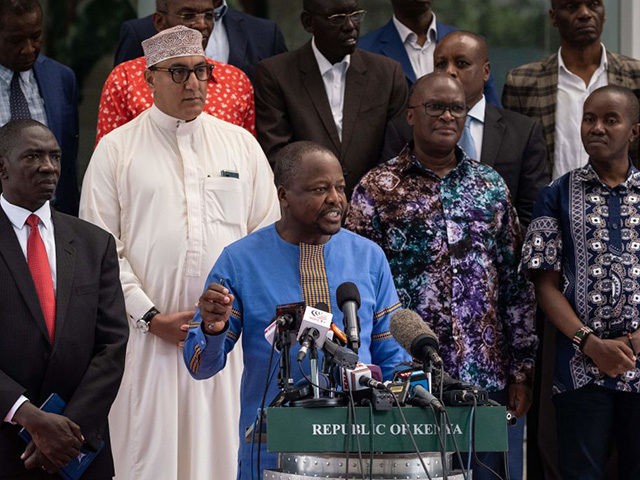Health Cabinet Secretary Mutahi Kagwe confirmed on Friday that a woman had tested positive for Chinese coronavirus in the country, the first to do so since the outbreak began in Wuhan, China, late last year.
Kagwe reportedly said the woman, who has not been identified, arrived in Nairobi after flying in from Ohio and making a stop in London, according to Kenya’s the Standard. Despite being a close partner of the Chinese Communist Party through its Belt and Road Initiative (BRI), Kenyan authorities have not yet identified any cases of coronavirus tied to the growing Chinese community in the country working on BRI projects, the largest of which is the Standard Gauge Railway (SGR). Prior to the confirmation of a case on Friday, Kenyans had expressed widespread outrage on social media after a video circulated of a flight from China landing in Nairobi.
“The government has taken preventative measures and is monitoring the patient … who is stable,” Kagwe reportedly told the media regarding the confirmed case. Kagwe assured the nation that Kenya had traced all the people who had been in contact with the woman before she tested positive and would be monitoring them for symptoms. The patient herself, he said, did not feel especially badly and was eating and alert, but would not be allowed outside of an isolation unit at a Nairobi hospital until she tests negative as a virus carrier.
The health official also urged Kenyans not to trust the government to protect them from the virus.
“We shouldn’t look at the government, Kenyans must take responsibility to curb the spread … like providing handwashing points,” he said.
The Kenyan government did implement a series of measures to contain the virus in the event that it may already be spreading among the general population.
“All religious crusades, gatherings, meetings interschool events and all events that of huge public nature have been suspended,” Kagwe noted. “Public transports providers [are] directed to provide hand sanitizers for clients and regular cleaning for their vehicles to passengers. Unless absolutely necessary, traveling to affected countries have been banned.”
The Kenyan government also banned visits to prisons and “warned against spreading misinformation,” though officials did not list any punishments for those the government deemed to be doing so. The Chinese government’s censorship of “misinformation” — medical advice like washing hands more often to protect from the virus — cost the world weeks, possibly months in the battle against the virus, experts concluded this week.
Kenyan authorities also attempted to calm the nation by asserting they would be hiring new medics “on an emergency basic contact.” Kenya has severe shortages in medical staff but routinely chooses to “hire” Cuban slave doctors over graduates of its own medical schools. A lawsuit by the organization representing Kenya’s doctors and other health workers in 2018 failed to stop an influx of Cuban doctors, which Nairobi paid Havana for, but who do not receive salaries. A year later, Kenya had to pay for extended classes for the doctors, stating that Cuban medical schools had not equipped them to properly offer care.
The Kenyan government did not make clear how it would be able to rapidly hire domestic health workers if the country did indeed have a chronic shortage of domestic medical workers that made hiring the Cubans necessary.
The government has also not been able to guarantee affordable care for potential coronavirus patients. Kenyan insurance companies confirmed on Friday they will “not meet medical bills for victims of the deadly coronavirus after the World Health Organisation (WHO) declared the disease a pandemic,” Kenya’s Daily Nation confirmed. “Standard medical insurance typically excludes epidemics and pandemics, meaning victims of the disease will not be able to recoup coronavirus-related expenses.”
“If there was to be a major attack, then all insurance companies would close shop. The claims will wipe the insurers out completely. That is why such exclusions are put in insurance policies,” said Tom Gichuhi, the head of the Association of Kenyan Insurers.
The Kenyan government faced widespread criticism, including from many lawmakers, last month after a video circulated online of a flight landing in Nairobi from China. At the time, the number of coronavirus cases was escalating rapidly in China, while only northern African states had identified cases. Kenya Airways, which administered the flight, reportedly fired an employee for sharing the video, but that employee insists that he did not film it — unknown Chinese persons awaiting the flight allegedly did — and has been wrongly maligned for sharing information vital to public health.

COMMENTS
Please let us know if you're having issues with commenting.